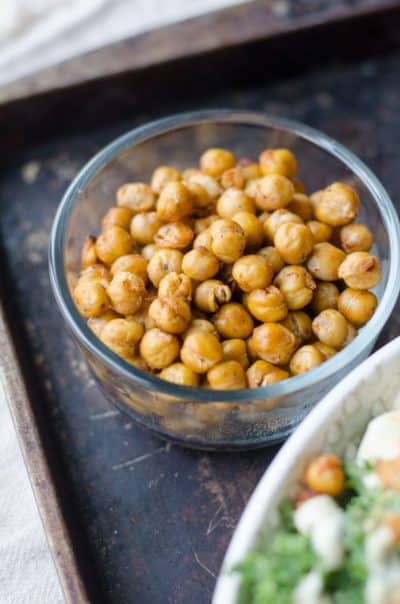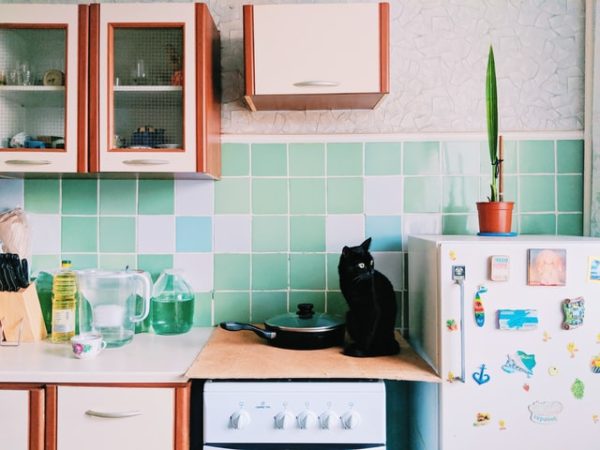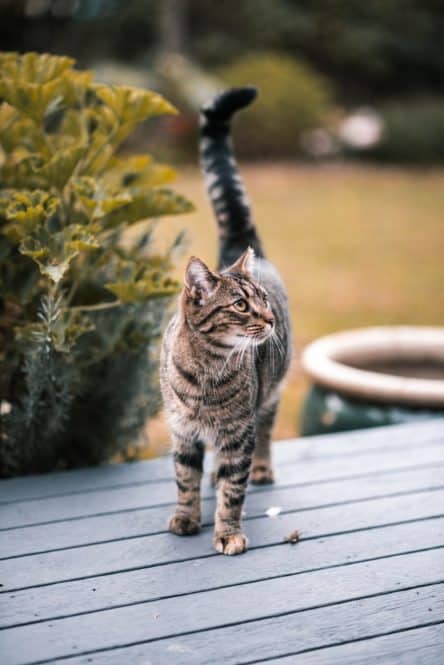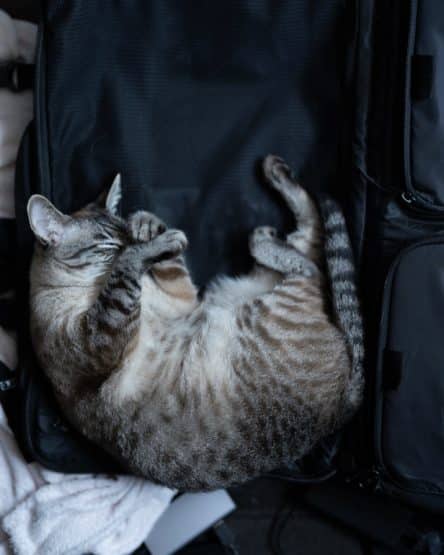Technically, cats are obligate carnivores. This means they thrive on animal protein and need very little vegetables and carbohydrates in their diet. ‘But can cats eat chickpeas?’, you might wonder.
In practice, things can be quite different. Cats can eat all kinds of foods by begging for treats or scavenging leftovers. Even if you feed them appropriate food, you may still need to know what other ingredients are safe for cars.
In this article we will find the answer to the question: are chickpeas bad for cats?
What are chickpeas?

Chickpeas, also called garbanzo beans, are a legume of round shape. Chickpea varieties have different colors, such as beige, green, red, or black.
Chickpeas are rich in fiber and protein. This is why they are preferred by vegetarians, who need a source of protein in their diet. They are seen as a healthy choice and a way to cut down on meat consumption.
In adults, one cup of chickpeas provides around 30% of the daily protein need.
Chickpea is one of the first cultivated legumes, with remains from 7500 years ago being found in Middle East sites.
This legume plays an important role in Mediterranean, Indian, and Middle Eastern cuisine. Chickpeas can be eaten boiled and cold in salads, can be cooked in stews, or ground into flour. Chickpea flour is the main ingredient in falafel, a type of fried balls.
Hummus is probably the most famous dish made from chickpeas. It consists of chickpeas ground into a paste and mixed with tahini (sesame seed paste).
All these are very healthy and tasty foods; could they appeal to your cat as well?
Nutritional value of chickpeas
Chickpeas are considered a healthy legume as they can replace animal protein. They contain a variety of beneficial ingredients:
- Dietary fiber (12.5 g for one cup of chickpeas)
- Iron and calcium
- Potassium (474 mg per cup)
- B vitamins
- Magnesium and selenium
- Selenium and beta carotene which act as antioxidants
- Choline, a chemical which is beneficial to the nervous system
- Vitamin E and vitamin K
- Zinc
- Copper
These ingredients are very health for humans, but do they have a positive impact on felines, too?
Health benefits of chickpeas
One of the most beneficial contents of chickpeas must be the dietary fiber. Which chickpeas have plenty of. Here are the main reasons why fiber is necessary to humans and animals alike:
- Preventing constipation
20% of people are affected by constipation. A study revealed that cats can suffer from this problem, too. 5.6% of cats included in the research were found to have trouble with their number twos.
Fiber consists of the non-digestible carbohydrates in plants and is found in fruits, vegetables, nuts, seeds, and grains. Fiber is important for gut health as it increases the size of stools and make them softer.
- Reducing inflammation in people with type 1 diabetes
A study from 2014 found that the intake of 30 g of fiber every day can help reduce inflammation in people with type 1 diabetes.
A diet high in fiber was found to lower blood glucose levels and reduce the risks of developing type 2 diabetes.
- Keeping your bones healthy
The calcium contained by chickpeas is beneficial to your bones. This is very important for vegetarians, who take their nutrients from plant-based foods only.
- Supporting heart health
The potassium, magnesium, and selenium in chickpeas are known to benefit the heart.
- Preventing cancer
The antioxidants in garbanzo beans help your body fight free radicals, with selenium being known as a powerful antioxidant.
- Promoting mental health
Your brain and nervous system function play a vital role in your mental health. A cup of chickpeas contains almost 70 mg of choline, a substance with a positive effect on learning, muscle control, mood, and metabolism.
With these beans being such a superfood, you might wonder: can cats eat chickpeas? You obviously want your cat to enjoy the same health benefits as you. However, their diet is very different from our omnivore eating habits. Don’t hurry to give your cat chickpeas yet!
Why would your cat eat chickpeas?

Most pet owners offer their cats commercially available food. These foods are specially formulated for cats, who need a large amount of animal protein and fat in their diets. Not even dog food (which also contains meat) is not suitable for your purrrfect ball of fur!
But life is too short to be bored, so it’s no wonder your cat is tempted to try all kinds of foods.
Some cats beg when they see their pet parents eating or even steal when you are not paying attention.
They may also search your garbage for fun.
Humans can give them unsuitable foods just to try. Or can feed their cats leftovers, which can contain the most unsuitable foods, like caramel.
So, don’t be surprised if your cat founds your hummus and gives it a try.
Should you feed your cat chickpeas?

Can cats eat chickpeas? The short answer is no.
Let’s see why it is not a good idea to feed your cat chickpeas.
First you need to understand what the ideal cat diet is.
Cats do not fall somewhere between omnivores and carnivores. They are obligate carnivores, even if they are domesticated. Their hunter instincts will never leave them.
Carnivores have digestive systems that do not handle plant foods very well. No matter how beneficial vegetables and legumes are for humans, they are not good for cats. Their nutritional value depends on the species consuming those foods. A carnivore will only get the nutrients they need from the meat of other animals.
You can include small amounts of plant foods in your cat’s diet. One of the safest ingredients is lettuce. But do not exaggerate because their gut flora is not equipped to break down plant matter.
Chickpeas are not the safest choices when it comes to giving your cat plants. Are chickpeas bad for cats? Not necessarily, as they are not toxic. The problem is they are not able to provide essential nutrients to your cat and are difficult to digest.
What about hummus?
Hummus can attract your cat because it has more flavor and fats. Adding oil and tahini to chickpeas can make them more appetizing. Fat is the reason why cats are attracted to odd foods, including ice cream. Cats don’t crave for sweets, as some owners erroneously think, but are going after the fat in certain foods.
Feeding hummus to your cat is even worse than giving it chickpeas. This delicious dip is added some ingredients that can be harmful to your cat:
- Salt – can cause poisoning in pets and cause vomiting, diarrhea, incoordination, lethargy, and thirst.
- Garlic and onion – both are known to be toxic to cats. The ingestion of large quantities can even be lethal.
A small amount of hummus may cause just a little digestive upset to your cat, but is preferable to avoid it. Your cat does not need this food in its diet, so choose other treats that are safe for felines.
Can cats eat chickpeas flour?

If you also have a dog, you might have seen chickpea flour as in ingredient in its food. This can make you wonder – can cats eat chickpea flour?
The answer is again no. Chickpea flour is still chickpea and is not suitable to felines. While chickpeas are totally acceptable in dog food in limited amounts, the situation is different for cats.
Dog food, regardless of its quality, is not suitable to cats. Dogs are to a certain extent omnivorous, but cats are not. Chickpea flour in pet food or in other forms is not a beneficial ingredient for cats.
Risks of feeding your cat chickpeas
If your cat eats a small amount of chickpeas, it can be perfectly fine unless it has a really sensitive stomach. Exceeding a certain limit can cause all kinds of problems:
- Allergic reactions
Chickpeas contain oxalic acid, a substance which can cause rashes and itching in pets predisposed to allergies.
- Obstructions in the cat’s stomach
Avoid hard raw chickpea beans as they can get stuck in the cat’s digestive system.
- Toxicity
If the cat ingests hummus that also contains onions and garlic, you should keep it under strict observation. These plants contain a toxin that causes anemia to cats. Even a small quantity of garlic can have devastating consequences. The responsible substances are disulfides and thiosuphates, which affect the cat’s red blood cells.
Symptoms of toxicity include pale gums, drooling, vomiting, diarrhea, weakness, lethargy, panting, lack of appetite, and coma. Take your cat to the vet immediately if you suspect it has ingested plants from the Allium family. These dangerous plants are onions, garlic, shallots, scallions, leeks, and chives.
Alternatives to chickpeas
As mentioned before, fiber is one of the reasons why chickpeas are so healthy. Your cat also needs fiber in its diet, but should you give it chickpeas?
Our advice is to avoid chickpeas and to ensure fiber intake from safer sources such as lettuce. There are better options for cats to combat constipation, such as cucumbers, apples, lettuce, and carrots. Make sure you offer vegetables in small quantities, though.
Bottom Line
Can cats eat chickpeas? Preferably not. You can offer this legume only in limited amounts and as an occasional treat. Make sure you don’t give it in the form of hummus, which can contain toxic ingredients for cats (garlic).
